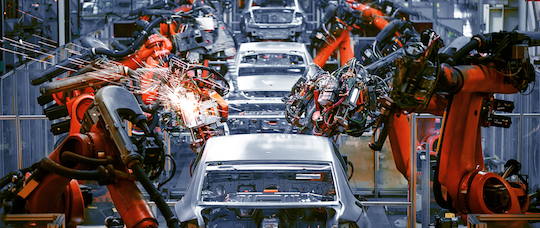Can Technology Save Us?
The economy has been trapped in a one-step-forward, two-steps-back cycle nearly a decade running.
One door opens, two slam shut.
A ray of sun cracks through, the overcast patches the hole.
Rapidly advancing technology offers a way out, its drummers claim.
They insist automation, robotics and artificial intelligence (AI) will soon catapult the economic system into vastly more productive realms.
By 2030 alone, they believe it could yield an additional $16 trillion to global GDP.
They further claim 40–50% of human occupations will be subject to automation over the next 15–20 years.
These are not limited to trucking, taxi driving or manufacturing and construction.
To these we must add white-collared jobs in law, finance, medicine, accounting, etc.
What will become of the attorney at law, we wonder — and the human conductor of the ambulance he chases?
We are unconvinced automation will proceed at the projected gallop.
But let us suspend all assumption for the moment… and drive on to the inevitable question:
What happens when robots acquire the brains to perform nearly all human labor?
Economist Joseph Schumpeter (1883–1950) put the term “creative destruction” into general circulation.
For Schumpeter, capitalism was the “perennial gale” of creative destruction.
Capitalism blows away the old and inefficient. In comes the new and improved.
Because of capitalism’s perennial gale, today’s serf lives more royally than yesteryear’s king.
Explains economist Richard Rahn of the Cato Institute:
The average low-income American, who makes $25,000 per year, lives in a home that has air conditioning, a color TV and a dishwasher, owns an automobile and eats more calories than he should from an immense variety of food…
Louis XIV lived in constant fear of dying from smallpox and many other diseases that are now cured quickly by antibiotics. His palace at Versailles had 700 rooms but no bathrooms (hence he rarely bathed), and no central heating or air conditioning.
Here is progress itself. All because capitalism’s creative gales flattened everything in sight.
The obvious benefits of capitalism are why most focus on the “creative” side of the ledger.
But what about the equally critical “destruction” side?
Innovation and technology have always allowed humans to mine fresh sources of productive employment.
The 19th-century farmer became the 20th-century factory worker… became the 21st-century computer programmer.
But an omnipotent robot would likely spell the end of the human laborer.
A robotic brute that can drive home a rivet is one thing.
But a genius robot that could do anything a human can do — only better — is yet another.
This robot would tower above the human as the human towers above the beasts of the field.
An Aristotle, a da Vinci, an Einstein would be a dunce next to it.
What human ability would lie beyond this unnatural beast?
Artistic expression?
A 900-IQ robot might run its circles around the human antique, you say.
But it could not appreciate beauty — much less express it.
The robot has a brain… but no soul.
No, the kingdom of the arts belongs to man alone.
Well, please introduce yourself to Aiva…
Aiva is a computerized composer.
Programmers had it soak in the music of Bach, Beethoven, Mozart and other colossi of the classical canon.
Based on the inputs, it taught itself to compose original music.
Its music is indistinguishable from a carbon-based professional’s.
Its tunes have been featured in cinematic soundtracks, advertisements and computer games.
Will the next Mozart be a computer?
Not even the oldest profession is safe from robotic competition — but let it pass for now.
Moreover, Schumpeter’s creatively destructive gales tear apart the social fabric …
Capitalism puts out its tongue at tradition.
It uproots communities. It swings the human being around hairpin turns of social and technological change… like a dizzied fly upon a wheel.
Within a generation, the centuries-old farming community is given over to the assembly line and the punch clock.
A generation later the factory goes dark as creative destruction blows the jobs clear to China… or Vietnam… or wherever labor is cheapest.
And Americans must constantly upend their families to follow the jobs — which pries apart the bonds of community.
And advancing technology makes today’s job obsolete tomorrow.
Not everyone can take up new lines.
Many are simply left behind, broken… and can never catch up.
The river of progress carries forward, as it must.
And yes — it must.
Do you reject progress?
Then the inventor of the wheel you must set down as a colossal villain.
If justice held, Ford should have been flattened by an auto, Franklin fried in an electric chair.
We disagree, with the highest respect.
But let us at least recognize…
The advancing river of progress sometimes takes the human note with it.
And not all change is progress…
Regards,
Brian Maher
Managing editor, The Daily Reckoning



Comments: